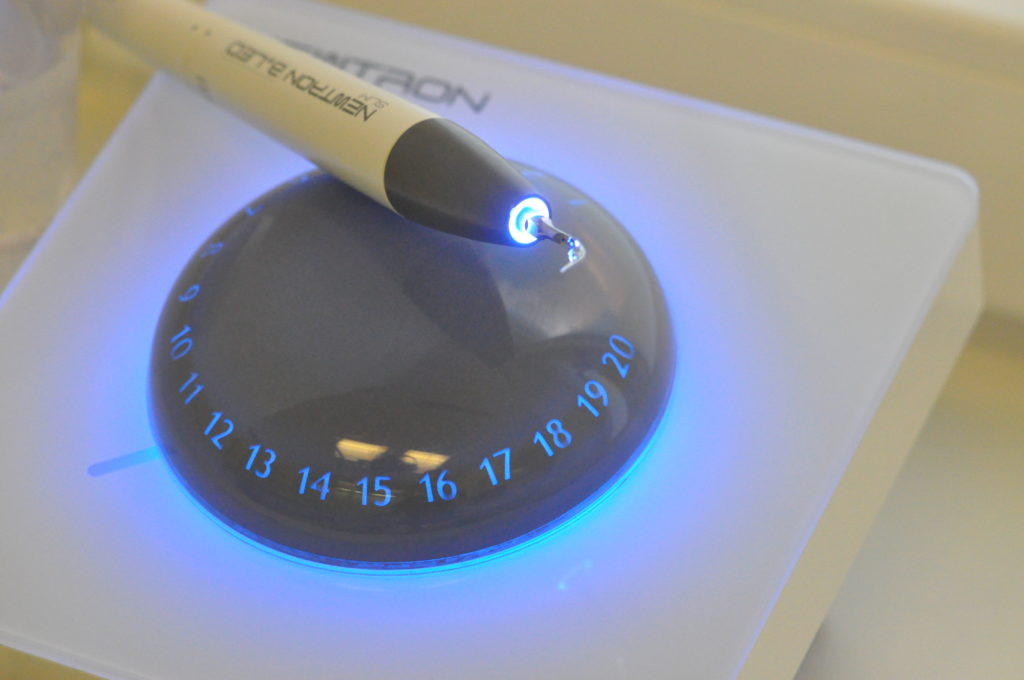 Periodontics
Periodontics
Periodontal disease or periodontitis is the inflammatory resorption of the bone tissue in which the teeth are rooted: it is characterized by bleeding gums, teeth that become loose, and abscesses. This is known as “tooth loosening”.
The immune system is unable to fight this disease.
There is a slowly evolving form, and an aggressive form that evolves more rapidly.
HOW DOES PERIODONTAL DISEASE OCCUR ?
It occurs because of genetically predisposed susceptibility but affects about half the population. In its most common form, it usually begins to appear around 35 to 40 years of age. The triggering factors are bacterial plaque and tartar which attack the gums and then the bone: many bacteria of different species organise themselves and cling strongly to the surface of the teeth: this is the bacterial biofilm. The deeper the bacteria penetrate, the more virulent they are and destroy the bone that supports the teeth. Only mechanical action can disrupt this biofilm.
Many other factors make this phenomenon worse: tobacco, stress, bruxism (clenching and grinding of teeth), as well as a number of diseases.
HOW TO TREAT PERIODONTITIS ?
We cannot cure periodontal disease, we can only stabilize it: our goal will be to slow down the resorption of the bone as much as possible and to restore the gums to a state of health that will allow them to become an effective barrier against bacteria over time.
For periodontal disease, traditional scaling is not enough, because the problem lies deep down.
Deep scaling (surfacing) and root polishing is intended to remove tartar from the surface of the teeth below the gumline. It will be carried out with sonic or manual instruments, and will be followed by careful polishing. It can be performed under local anesthesia if necessary.
If the disease is not treated properly, it is associated with two main problems :
- – Visible plaque provides a refuge for bacterial colonization.
- – Scaling and surfacing that is not followed by polishing leaves the tooth surface rough, which is ideal for plaque to settle back in.
This cleansing can only be effective if brushing is efficient and interdental brushes are used at least once or twice a day. This is teamwork: no lasting results can be achieved without active participation of the patient for the rest of their life.
This obviously involves a change in habits, and this is an important daily effort when you have been brushing your teeth in the same way since your childhood!
In some people, the bone damage is a little too severe for this surface cleaning to be sufficient: the bacteria have penetrated too deeply into the tissues and periodontal pockets develop. In this case, flap surgery could be necessary. One major objective of flap surgery is to eliminate or reduce the pocket itself. To access it, a flap-like incision is made in the gum tissue. This allows diseased tissue to be removed from inside the pocket, and provides access to the teeth’s root surfaces for a thorough cleaning, which helps to eliminate harmful plaque and calculus (tartar). Afterward, the “flap” is closed, sealing the area. This begins the healing process, which takes place rapidly.
HOW CAN THE RESULTS BE MADE TO LAST ?
Once the disease has been stabilised, your periodontologist will give you maintenance appointments.
The goal is to prevent the resumption of bone resorption. Appointments will therefore be necessary on a regular basis and, at the same time, efforts on brushing will have to be continued.
WHAT CAN BE DONE TO PREVENT PERIODONTITIS ?
Your dentist has a screening role: an annual check-up ensures that periodontal disease is not setting in. If this is the case, the earlier the treatment, the longer the teeth can be kept.
Good dental hygiene is the second key to prevention. Your periodontist will help you to brush your teeth properly: brushing is not enough, it must be done effectively.
Opening hours
| Monday – Thursday | 9:30 – 19:00 |
| Friday | 9:30 – 18:30 |
| Some Saturdays | 9:00 – 15:00 |
01 40 53 98 82
HOW TO FIND US ?
100, Avenue de Villiers
75017 Paris


